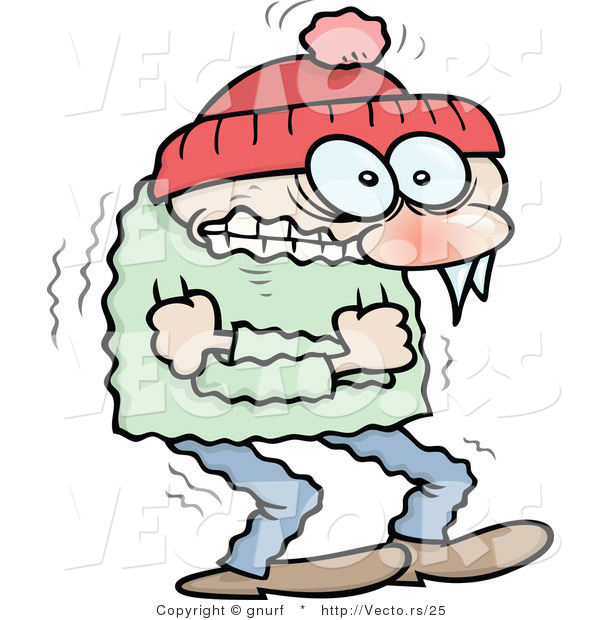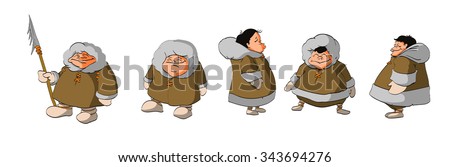Cold weather plays a
major role in how people live and survive. The cold is an environmental stress that
negatively impacts the survival of humans because we can develop hypothermia,
which is life threatening to humans. Living in the cold is hard because you can
not be outside for a very long time because our bodies are not made to keep us
warm. If humans stay out in the cold for to long our core body temperature will
drop and the hypothalamus will fail causing death. This environmental stress would
impact humans trying to eat, live, and sleep. People living in the cold are usually
depleted of vitamin D and even experience affected oxygen levels. It makes
survival hard because it limits time for being outside trying to find food and
it makes living harder because you must consistently worry about keeping your
body warm.
 A
short-term adaption to the cold would be shivering. Shivering is a homeostatic function
in response to the cold in warm-blooded animals. Humans shivering reflex is
triggered to maintain homeostasis.
A
short-term adaption to the cold would be shivering. Shivering is a homeostatic function
in response to the cold in warm-blooded animals. Humans shivering reflex is
triggered to maintain homeostasis.  A facultative
adaption to the cold could be gaining weight to keep warmer. By eating more
foods, the bodies Basal Metabolic Rate will increase, which will produce body
heat.
A facultative
adaption to the cold could be gaining weight to keep warmer. By eating more
foods, the bodies Basal Metabolic Rate will increase, which will produce body
heat. Developmental adaptions to the cold weather are body size and shape. According to Allen’s Rule, people with shorter, smaller limbs are going to be able to maintain more body heat. The shorter limbs make the body more condensed, which then have smaller surface area. Having a smaller surface area compared to body mass will help the body heat not be lost to the environment as easily.
Cultural adaptions to the cold would be nutrition. People living in
colder climates are going to consume much more carbohydrates. Carbs are complex organic compounds that are the main source of fuel for the metabolic process. Carbs take a long time to be broken down, which gives people long lasting energy and body heat.
Studying
human variation from this perspective is beneficial because it can help us
understand why people in different regions and cultures live the way they do. This
information is very useful because it can tell us so many things from why
someone might look the way they do physically, why they might eat certain
foods, and why they might live longer in one region rather than in another. For
example, if you are teaching young children about different cultures around the
world, you can use this information to explain why they are different, which is
a lot of the time due to the environment. You can use the information in a
productive way by analyzing your own environment and seeing what adaptions your
own body has made, this helps one understand why they might live a certain way.
In my
opinion since race is a social construct it is hard for me to use it to
understand the variation of adaptions. Using race by saying one’s skin is
darker because they live in hotter climates and they produce more melanin for
skin protection doesn’t make sense. This doesn’t make sense because even if
your black and were born in the artic your skin wouldn’t magically turn white. Skin
color adaptions have taken thousands of years to adapt and change. So, I guess
using race to understand how our human ancestors lived and adapted to the environment
makes more since, but it doesn’t make sense to use the skin colors we have
today to understand variation of adaptions. Studying environmental influences on
adaptions is a better way to understand human variation because the color of
our skin does not determine where we live. Not studying skin color but studying
other important adaptions like nutrition, oxygen levels, or culture can help
one better understand how the environment might affect a person. Looking at the
environmental factors can give someone insight on why some one lives the way
they do. Skin color does not determine all the factors.

Mackenzie!
ReplyDeleteI thought you used great examples for your four adaptations, but the one I found the most interesting was the facultative adaptation. When I think of gaining weight as a long term way to stay warm, I laugh. It seems like something that is mentioned in more of a sarcastic tone, but by reading through your post I have found that that is not true and the more I think of it the more it makes sense so thank you for that. I agree with you in that it makes way more sense to study adaptations through environmental changes rather than race, because as you mentioned skin adaptations have taken years upon years, and that process would not be reversed because they move to the opposite climate. How the physical body reacts and changes is a far better way to compare humans amongst different environments instead of simply looking at their skin color.
You wander a bit through your opening section. Yes, cold stress can lead to hypothermia, which is defined as a drop in body temperature below the optimal 98.6 degrees, but why is this a problem? Why can't the body and its organs function well below this temperature? What happens when the temperature drops?
ReplyDeleteA drop in Vitamin D is due to reduced exposure to solar radiation, not cold stress. Not sure about the issue of oxygenation? This is a problem with high altitude, not cold. Yes, it can be colder to find food in cold environments, but hypothermia will kill you before you starve to death!
Good discussions on all four of your adaptations.
I agree that knowledge is always useful, but can you identify a way this knowledge can be useful in a concrete way? Can knowledge on adaptations to cold climates have medical implications? Help us develop clothing that retains heat more efficiently? Can we develop new means of home/building construction that might help increase heat retention? How can we actually use this information in an applied fashion?
"So, I guess using race to understand how our human ancestors lived and adapted to the environment makes more since"
Here's a question for you... since race is a social construct, did the concept of "race" exist thousands of years ago? Or is it a recent invention, arising from an increase in social interactions between humans from different parts of the world?
But aside from this one tiny allowance on your part that there might be a way to use race, you were right the rest of the time. There is NOT a way to use race to understand human variation. The question is, why not? As you explain, race is not based in biology but is a social construct, based in beliefs and preconceptions, and used only to categorize humans into groups based upon external physical features, much like organizing a box of crayons by color. Race does not *cause* adaptations like environmental stress do, and without that causal relationship, you can't use race to explain adaptations. Race has no explanatory value over human variation.